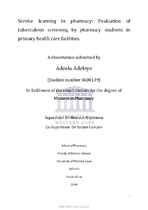Service learning in pharmacy: Evaluation of tuberculosis screening by pharmacy students in primary health care facilities.
Abstract
Background: Tuberculosis (TB) is one of the arms of the so-called quadruple burden of
disease in South Africa. One of the major impediments to TB control is failure to detect the
disease, and undiagnosed cases in the community can remain a source of onward
transmission promulgating the epidemic. TB screening is thus the starting point for any
intervention in tuberculosis control. At UWC, the pharmacy educational curriculum includes
a service-learning in pharmacy (SLiP) programme which entails pharmacy students of all
years visiting designated community health care facilities, and then perform various priority
health tasks. During 2014 the second year SLiP programme was launched at primary health
care facilities. The first semester programme focussed on tuberculosis screening and
cardiovascular risk assessment. The aim of this study was to evaluate the implementation
of the TB screening aspect of the second year service-learning programme, based on the
perceptions of the participating students and nurses, and students’ TB screening
reports; and also to find out the perceived impact of the TB screening aspect of the
second year SLiP programme on the patients’ health education, the nurses’ workload,
and on the students’ learning and skill development at the various public primary health
care facilities in the Cape Town Metro-pole area.
Objectives: To determine the perceptions of students and nursing staff on TB screenings
done by pharmacy students at primary health care facilities, compare these perceptions with
actual TB reports compiled by pharmacy students, and assess the perceived impact of
students’ TB screenings at the facilities.

